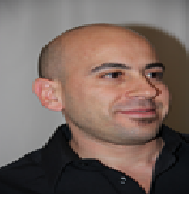Scientific Program

N. C. Tolga EMRE
Bogazici University, Turkey
Title: Interferon Regulatory Factor 4 in Cancer Gene Regulation
Biography:
N C Tolga Emre received his doctoral degree from the University of Pennsylvania in 2005, and did postdoctoral work at US National Institutes of Health. He is a faculty at Bogazici University Department of Molecular Biology & Genetics in Istanbul/Turkey since 2011, currently as an associate professor, and group leader at the Laboratory of Genome Regulation. Dr. Emre’s research focuses on gene regulatory mechanisms, especially epigenetic chromatin modifications and transcription factors in cancers. His research has been funded by grants from European Commission, European Molecular Biology Organisation, Scientific and Technological Research Council of Turkey and Bogazici University. Dr. Emre is a recipient of 2013 Young Scientist award from Science Academy Foundation of Turkey.
Abstract
Abnormal activities of epigenetic modifiers and transcription factors play critical roles in shaping the aberrant gene expression programs of cancer cells. Identification of the target genes and signaling pathways controlled by such factors are an important step in designing targeted therapies against cancers. Interferon regulatory factor 4 (IRF4) is a transcriptional regulator with crucial roles in the development and functioning of immune cells, and implicated in malignant transformation (1). We have previously shown a critical role for IRF4 in a variety of B-cell cancer cells, and identified its mechanisms of action (2-4). These and related work point to IRF4 pathways as therapy targets in cancers. Several studies also implicate IRF4 function in non-immune cells, such as in melanocytes (5). For instance, a number of genome-wide genetic studies associated variation at the IRF4 gene with pigmentation phenotypes and skin cancers. However, despite the observed genetic links and generally high expression, the role of IRF4 in skin cancers remains under-studied and poorly understood. Therefore, we set out to identify the functions of IRF4 in skin cancer cells using genome-wide, cell and molecular biological approaches. We have taken a candidate approach to discover the upstream modulators of IRF4 expression in these cells. In parallel, we have performed localization (ChIP-seq) and transcriptomic (RNA-seq) assays in order to identify its genome-wide targets. These analyses, together with analyses of The Cancer Genome Atlas (TCGA) data, point to a role of IRF4 in epigenetic regulation of these cells, in addition to other cancer- and development-related pathways. Furthermore, our preliminary studies implicate IRF4 as a critical factor in skin cancer cell proliferation and survival. Taken together, our work on IRF4 provides mechanistic insight at the cellular and molecular level in cancers, and point to potential new therapy strategies.
- Future perspectives in Tissue Engineering and Regenerative Medicine
- Stem Cell Engineering (SCE) & Tissue Engineering
- Tissue repair and Rejuvenation
- Skin Tissue Engineering and Wound healing
- 3D Bio Printing and Bio Fabrication
- Regenerative Medicine
- Scaffolds Used In Tissue Engineering
- Bone and Cartilage Tissue Engineering
- Tissue Chip for Drug Screening
- Biosensors & Biomaterials and Bio artificial Organs

